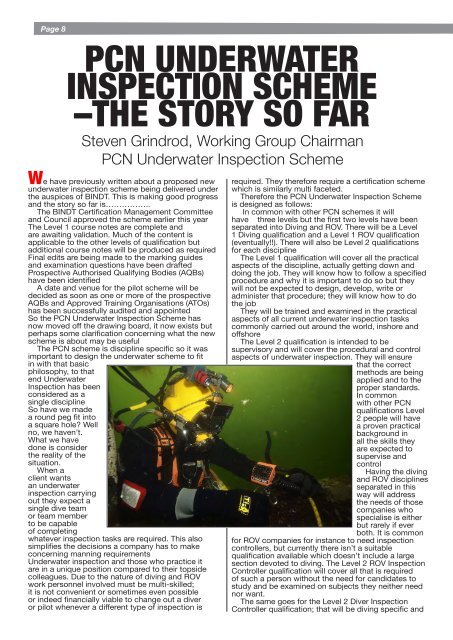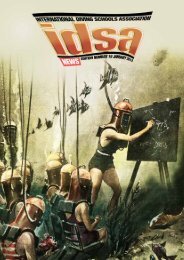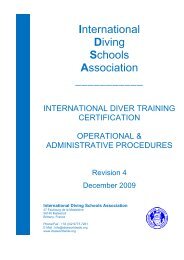Newsletter No. 20 - pdf ADOBE - IDSA The International Diving ...
Newsletter No. 20 - pdf ADOBE - IDSA The International Diving ...
Newsletter No. 20 - pdf ADOBE - IDSA The International Diving ...
Create successful ePaper yourself
Turn your PDF publications into a flip-book with our unique Google optimized e-Paper software.
Page 8<br />
PCN UNDERWATER<br />
INSPECTION SCHEME<br />
–THE STORY SO FAR<br />
Steven Grindrod, Working Group Chairman<br />
PCN Underwater Inspection Scheme<br />
We have previously written about a proposed new<br />
underwater inspection scheme being delivered under<br />
the auspices of BINDT. This is making good progress<br />
and the story so far is……………..<br />
<strong>The</strong> BINDT Certification Management Committee<br />
and Council approved the scheme earlier this year<br />
<strong>The</strong> Level 1 course notes are complete and<br />
are awaiting validation. Much of the content is<br />
applicable to the other levels of qualification but<br />
additional course notes will be produced as required<br />
Final edits are being made to the marking guides<br />
and examination questions have been drafted<br />
Prospective Authorised Qualifying Bodies (AQBs)<br />
have been identified<br />
A date and venue for the pilot scheme will be<br />
decided as soon as one or more of the prospective<br />
AQBs and Approved Training Organisations (ATOs)<br />
has been successfully audited and appointed<br />
So the PCN Underwater Inspection Scheme has<br />
now moved off the drawing board, it now exists but<br />
perhaps some clarification concerning what the new<br />
scheme is about may be useful<br />
<strong>The</strong> PCN scheme is discipline specific so it was<br />
important to design the underwater scheme to fit<br />
in with that basic<br />
philosophy, to that<br />
end Underwater<br />
Inspection has been<br />
considered as a<br />
single discipline<br />
So have we made<br />
a round peg fit into<br />
a square hole? Well<br />
no, we haven’t.<br />
What we have<br />
done is consider<br />
the reality of the<br />
situation.<br />
When a<br />
client wants<br />
an underwater<br />
inspection carrying<br />
out they expect a<br />
single dive team<br />
or team member<br />
to be capable<br />
of completing<br />
whatever inspection tasks are required. This also<br />
simplifies the decisions a company has to make<br />
concerning manning requirements<br />
Underwater inspection and those who practice it<br />
are in a unique position compared to their topside<br />
colleagues. Due to the nature of diving and ROV<br />
work personnel involved must be multi-skilled;<br />
it is not convenient or sometimes even possible<br />
or indeed financially viable to change out a diver<br />
or pilot whenever a different type of inspection is<br />
required. <strong>The</strong>y therefore require a certification scheme<br />
which is similarly multi faceted.<br />
<strong>The</strong>refore the PCN Underwater Inspection Scheme<br />
is designed as follows:<br />
In common with other PCN schemes it will<br />
have three levels but the first two levels have been<br />
separated into <strong>Diving</strong> and ROV. <strong>The</strong>re will be a Level<br />
1 <strong>Diving</strong> qualification and a Level 1 ROV qualification<br />
(eventually!!). <strong>The</strong>re will also be Level 2 qualifications<br />
for each discipline<br />
<strong>The</strong> Level 1 qualification will cover all the practical<br />
aspects of the discipline, actually getting down and<br />
doing the job. <strong>The</strong>y will know how to follow a specified<br />
procedure and why it is important to do so but they<br />
will not be expected to design, develop, write or<br />
administer that procedure; they will know how to do<br />
the job<br />
<strong>The</strong>y will be trained and examined in the practical<br />
aspects of all current underwater inspection tasks<br />
commonly carried out around the world, inshore and<br />
offshore<br />
<strong>The</strong> Level 2 qualification is intended to be<br />
supervisory and will cover the procedural and control<br />
aspects of underwater inspection. <strong>The</strong>y will ensure<br />
that the correct<br />
methods are being<br />
applied and to the<br />
proper standards.<br />
In common<br />
with other PCN<br />
qualifications Level<br />
2 people will have<br />
a proven practical<br />
background in<br />
all the skills they<br />
are expected to<br />
supervise and<br />
control<br />
Having the diving<br />
and ROV disciplines<br />
separated in this<br />
way will address<br />
the needs of those<br />
companies who<br />
specialise is either<br />
but rarely if ever<br />
both. It is common<br />
for ROV companies for instance to need inspection<br />
controllers, but currently there isn’t a suitable<br />
qualification available which doesn’t include a large<br />
section devoted to diving. <strong>The</strong> Level 2 ROV Inspection<br />
Controller qualification will cover all that is required<br />
of such a person without the need for candidates to<br />
study and be examined on subjects they neither need<br />
nor want.<br />
<strong>The</strong> same goes for the Level 2 Diver Inspection<br />
Controller qualification; that will be diving specific and




